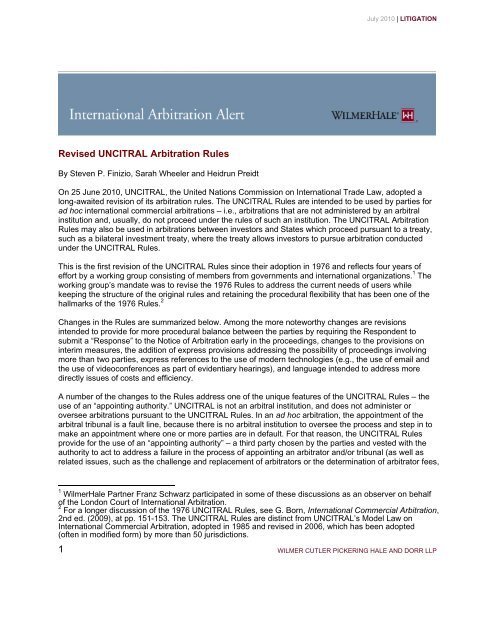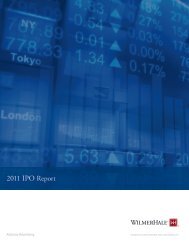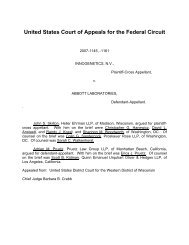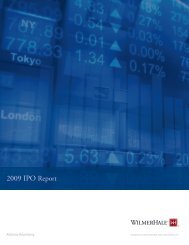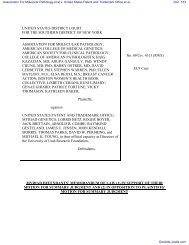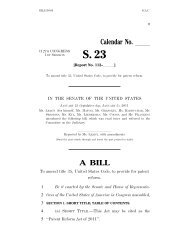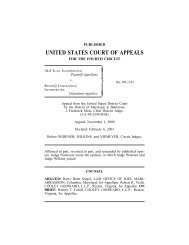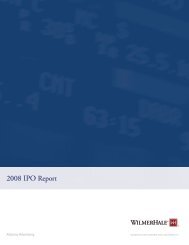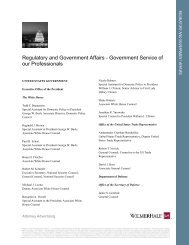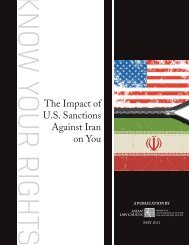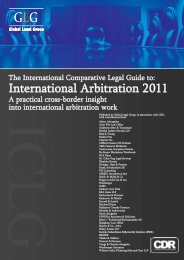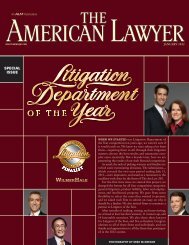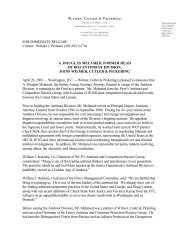1 Revised UNCITRAL Arbitration Rules - WilmerHale
1 Revised UNCITRAL Arbitration Rules - WilmerHale
1 Revised UNCITRAL Arbitration Rules - WilmerHale
Create successful ePaper yourself
Turn your PDF publications into a flip-book with our unique Google optimized e-Paper software.
July 2010 | LITIGATION<br />
<strong>Revised</strong> <strong>UNCITRAL</strong> <strong>Arbitration</strong> <strong>Rules</strong><br />
By Steven P. Finizio, Sarah Wheeler and Heidrun Preidt<br />
On 25 June 2010, <strong>UNCITRAL</strong>, the United Nations Commission on International Trade Law, adopted a<br />
long-awaited revision of its arbitration rules. The <strong>UNCITRAL</strong> <strong>Rules</strong> are intended to be used by parties for<br />
ad hoc international commercial arbitrations – i.e., arbitrations that are not administered by an arbitral<br />
institution and, usually, do not proceed under the rules of such an institution. The <strong>UNCITRAL</strong> <strong>Arbitration</strong><br />
<strong>Rules</strong> may also be used in arbitrations between investors and States which proceed pursuant to a treaty,<br />
such as a bilateral investment treaty, where the treaty allows investors to pursue arbitration conducted<br />
under the <strong>UNCITRAL</strong> <strong>Rules</strong>.<br />
This is the first revision of the <strong>UNCITRAL</strong> <strong>Rules</strong> since their adoption in 1976 and reflects four years of<br />
effort by a working group consisting of members from governments and international organizations. 1 The<br />
working group’s mandate was to revise the 1976 <strong>Rules</strong> to address the current needs of users while<br />
keeping the structure of the original rules and retaining the procedural flexibility that has been one of the<br />
hallmarks of the 1976 <strong>Rules</strong>. 2<br />
Changes in the <strong>Rules</strong> are summarized below. Among the more noteworthy changes are revisions<br />
intended to provide for more procedural balance between the parties by requiring the Respondent to<br />
submit a “Response” to the Notice of <strong>Arbitration</strong> early in the proceedings, changes to the provisions on<br />
interim measures, the addition of express provisions addressing the possibility of proceedings involving<br />
more than two parties, express references to the use of modern technologies (e.g., the use of email and<br />
the use of videoconferences as part of evidentiary hearings), and language intended to address more<br />
directly issues of costs and efficiency.<br />
A number of the changes to the <strong>Rules</strong> address one of the unique features of the <strong>UNCITRAL</strong> <strong>Rules</strong> – the<br />
use of an “appointing authority.” <strong>UNCITRAL</strong> is not an arbitral institution, and does not administer or<br />
oversee arbitrations pursuant to the <strong>UNCITRAL</strong> <strong>Rules</strong>. In an ad hoc arbitration, the appointment of the<br />
arbitral tribunal is a fault line, because there is no arbitral institution to oversee the process and step in to<br />
make an appointment where one or more parties are in default. For that reason, the <strong>UNCITRAL</strong> <strong>Rules</strong><br />
provide for the use of an “appointing authority” – a third party chosen by the parties and vested with the<br />
authority to act to address a failure in the process of appointing an arbitrator and/or tribunal (as well as<br />
related issues, such as the challenge and replacement of arbitrators or the determination of arbitrator fees,<br />
1 <strong>WilmerHale</strong> Partner Franz Schwarz participated in some of these discussions as an observer on behalf<br />
of the London Court of International <strong>Arbitration</strong>.<br />
2 For a longer discussion of the 1976 <strong>UNCITRAL</strong> <strong>Rules</strong>, see G. Born, International Commercial <strong>Arbitration</strong>,<br />
2nd ed. (2009), at pp. 151-153. The <strong>UNCITRAL</strong> <strong>Rules</strong> are distinct from <strong>UNCITRAL</strong>’s Model Law on<br />
International Commercial <strong>Arbitration</strong>, adopted in 1985 and revised in 2006, which has been adopted<br />
(often in modified form) by more than 50 jurisdictions.<br />
1<br />
WILMER CUTLER PICKERING HALE AND DORR LLP
July 2010 | LITIGATION<br />
if disputed). 3 As discussed in more detail below, the revised <strong>Rules</strong> include changes regarding the<br />
competence of an appointing authority and the role of the designating authority, and now provide that the<br />
parties may choose the Secretary General of the Permanent Court of <strong>Arbitration</strong> at The Hague (PCA) as<br />
the appointing authority.<br />
The revised <strong>Rules</strong> will apply to arbitrations where the arbitration agreement was concluded on or after 15<br />
August 2010. Unless the parties agree otherwise, the original version of the <strong>Rules</strong> (referred to below as<br />
the 1976 <strong>Rules</strong>) will remain in force for arbitrations in which the agreement to arbitrate was concluded<br />
before that date.<br />
The revised <strong>Rules</strong> maintain the structure of the 1976 <strong>Rules</strong> and continue to be divided into four sections –<br />
(i) Introductory <strong>Rules</strong>, (ii) Composition of the Arbitral Tribunal, (iii) Arbitral Proceedings, and (iv) the Award.<br />
Revisions to each section are discussed in turn below.<br />
Section I: Introductory <strong>Rules</strong><br />
As described in more detail below, Section I of the <strong>Rules</strong> has been subject to several noteworthy changes,<br />
including the removal of the provision that the arbitration agreement must be in writing, the revision of the<br />
notice requirements, new provisions requiring the Respondent to file a Response to the Notice of<br />
<strong>Arbitration</strong> and changes to the roles of the designating and appointing authorities.<br />
Scope of Application<br />
• Article 1 has been amended to remove the requirement that an arbitration agreement must be in<br />
writing. This revision is intended to reflect the concern that retaining the writing requirement would<br />
conflict with the more “liberal” understanding of the form requirement under certain national laws and<br />
the <strong>UNCITRAL</strong> Model Law on International Commercial <strong>Arbitration</strong> which do not impose form<br />
requirements for arbitration agreements. The revision leaves the question of such formal<br />
requirements to the applicable law.<br />
• The <strong>Rules</strong> include as an annex a model arbitration clause for use by parties wishing to arbitrate<br />
disputes using the <strong>Rules</strong>. The new <strong>Rules</strong> make one revision to the model clause. The 1976 <strong>Rules</strong><br />
state that parties using the model clause “may wish to” include in their arbitration agreement<br />
provisions setting out: (a) the appointing authority; (b) the number of arbitrators; (c) the place of<br />
arbitration; and (d) the language to be used. The revised <strong>Rules</strong> now indicate that the parties “should”<br />
include such provisions. The revised <strong>Rules</strong> also now include a “Possible Waiver Statement,” which<br />
parties can add to their arbitration agreement and is intended to expressly exclude recourse against<br />
the arbitral award to the extent permitted by applicable law. The waiver statement, and some of its<br />
implications, are discussed in the section on the "Form and Effect of the Award" below.<br />
Notice and Calculation of Periods of Time<br />
• Article 2 addresses how notices are transmitted, including when they are received or deemed to be<br />
received, as well as how periods of time are calculated under the <strong>Rules</strong> (Article 2(6), which remains<br />
unchanged). Article 2 has been restructured and includes new provisions. Among other changes,<br />
Article 2 has been revised to reflect changes in technology and clarifies that notices may be<br />
3 The appointing authority can be a particular person or institution (indeed, parties often designate an<br />
arbitral institution, such as the International Chamber of Commerce (ICC) or the American <strong>Arbitration</strong><br />
Association (AAA) to be the appointing authority). As discussed below, the <strong>Rules</strong> provide that if the<br />
parties fail to designate an appointing authority, and one is required, the Secretary General of the<br />
Permanent Court of <strong>Arbitration</strong> (PCA) at The Hague will act as the “designating authority,” and, in that<br />
capacity, designate an appointing authority.<br />
2<br />
WILMER CUTLER PICKERING HALE AND DORR LLP
July 2010 | LITIGATION<br />
transmitted by “any means of communication” that provides for a record of its transmission, and<br />
specifically refers to the use of facsimile and email.<br />
Notice of <strong>Arbitration</strong><br />
• Article 3 addresses how (Article 3(1)) and when (Article 3(2)) an arbitration commences and<br />
describes required and optional contents of a Notice of <strong>Arbitration</strong>. Section 3(3) identifies the<br />
information that a Notice of <strong>Arbitration</strong> “shall” include and Section 3(4) identifies information that a<br />
Notice of <strong>Arbitration</strong> “may” include.<br />
• Among other changes, Article 3(3)(d) has been revised so that it no longer requires “a reference to<br />
the contract” from which the dispute arises but rather the “identification of any contract or other<br />
legal instrument out of or in relation to which the dispute arises.” Article 3(3)(e) has been<br />
revised to require a “brief description” of the claim rather than the indication of the “general nature”<br />
of the claim required by the 1976 <strong>Rules</strong>. Article 3(3)(g) also now specifies that the Claimant should<br />
provide in the Notice of <strong>Arbitration</strong> a proposal concerning the number of arbitrators, the language, and<br />
the place of arbitration if any of those elements have not been agreed upon by the parties.<br />
• Article 3(4) provides that in its Notice of <strong>Arbitration</strong> the Claimant should, as appropriate based on the<br />
parties’ arbitration agreement, propose (a) the designation of an appointing authority, (b) the<br />
appointment of a sole arbitrator or (c) the notice of the appointment of an arbitrator referred to under<br />
Articles 9 and 10 (see below).<br />
• Under Article 3(4) of the 1976 <strong>Rules</strong>, the Notice of <strong>Arbitration</strong> could also be designated as the<br />
Claimant’s Statement of Claim (assuming it included a statement of the facts supporting the claim, the<br />
points at issue and the relief requested). While under the revised <strong>Rules</strong>, the Notice of <strong>Arbitration</strong> must<br />
include “a brief description of the claim and an indication of the amount involved … the relief or<br />
remedy sought,” Article 3 no longer expressly refers to including the Statement of Claim in the Notice<br />
of <strong>Arbitration</strong> and, as discussed below, the revised <strong>Rules</strong> now require that the Respondent provide a<br />
“Response” to the Notice of <strong>Arbitration</strong> within 30 days of receiving it. The deletion of the reference in<br />
Article 3 to including the Statement of Claim in the Notice of <strong>Arbitration</strong> does not mean that the<br />
Claimant cannot now elect to treat its Notice of <strong>Arbitration</strong> as its Statement of Claim (Article 20(1) of<br />
the revised <strong>Rules</strong> still allows a Claimant to do so), but the revision to Article 3 reinforces the new<br />
approach in the revised <strong>Rules</strong>, which is to provide the Respondent with the opportunity – and the<br />
obligation – to file a response to the Notice of <strong>Arbitration</strong> at the outset of the proceedings rather than<br />
having to wait until after the Statement of Claim to first state its position in its Statement of Defence.<br />
• Article 3(5) clarifies that the constitution of the arbitral tribunal shall not be hindered if the Claimant<br />
submits an incomplete Notice of <strong>Arbitration</strong>.<br />
Response to the Notice of <strong>Arbitration</strong><br />
• <strong>Revised</strong> Article 4 now requires the Respondent to submit an answering submission (called a<br />
“Response”) within 30 days of receiving the Claimant’s Notice of <strong>Arbitration</strong>. As noted, Article 4<br />
reflects a change in the basic procedure of the 1976 <strong>Rules</strong> and brings them in line with other<br />
arbitration rules. This is intended to rectify an imbalance under the 1976 <strong>Rules</strong>, which did not give the<br />
Respondent an opportunity to set out its position until it submitted its Statement of Defence – which<br />
was after the constitution of the arbitral tribunal and, in practice, often after the procedures and<br />
timetable for the case had been established.<br />
• Article 4(1) identifies the information the Response “shall” contain, which corresponds to the<br />
information required for the Notice of <strong>Arbitration</strong> as set out in Article 3(3)(c) to (g).<br />
3<br />
WILMER CUTLER PICKERING HALE AND DORR LLP
July 2010 | LITIGATION<br />
• Article 4(2)(a) to (f) identifies the information the Response “may” contain. Apart from the option to<br />
raise jurisdictional objections, the appointment of the appointing authority and arbitrators<br />
(corresponding to Article 4(2)(a) to (c)), Article 4(2) allows the Respondent to assert counterclaims or<br />
claims for the purpose of set-off and to join third parties. This revision helps to create balance<br />
between the parties by ensuring that critical aspects of the dispute have been identified before the full<br />
constitution of the tribunal and before important procedural decisions are considered.<br />
• Article 4(3) (as with Article 3(5)) states that the constitution of the tribunal shall not be hindered by<br />
any failure by the Respondent to communicate the Response or to submit an incomplete or late<br />
Response and provides that the tribunal will resolve any disputes about the completeness of the<br />
Response.<br />
Representation and Assistance<br />
• Article 5 (revising Article 4 of the 1976 <strong>Rules</strong>) provides that each party may be represented or<br />
assisted by parties chosen by it, but clarifies that, where a person is to act as a representative of a<br />
party, the tribunal may at any time on its own initiative or at the request of a party require proof of the<br />
representative’s authority.<br />
Designating and Appointing Authorities<br />
• As described above, the existence of an appointing authority is a critical aspect of the 1976 <strong>Rules</strong>.<br />
New Article 6 seeks to underline the importance of the appointing authority and to clarify the<br />
respective roles of the appointing and designating authorities. Article 6 of the <strong>Rules</strong> consolidates the<br />
provisions relating to the appointing authority, which were divided in the 1976 <strong>Rules</strong> between former<br />
Article 6 (Sole Arbitrator Appointment) and Article 7 (Appointment of Three Arbitrator Tribunal).<br />
• Where the parties have not already agreed on an appointing authority at an earlier stage, Article 6(1)<br />
provides that the parties may propose an appointing authority at any time during the proceeding.<br />
While the default rule in Article 6(2) provides that the Secretary General of the PCA will be the<br />
“designating authority” if the parties fail to agree upon an appointing authority, 4 revised Article 6(1)<br />
now clarifies that the parties also may designate the Secretary General of the PCA to act as the<br />
appointing authority, and not only as the designating authority.<br />
• Other provisions in Article 6 clarify the role of the designating and appointing authorities. For example,<br />
Article 6(4) now provides that where the designated appointing authority fails to appoint an arbitrator<br />
within 30 days (as compared to 60 days under the 1976 <strong>Rules</strong>) or refuses to act or fails to comply<br />
with any other time limits as set forth in the <strong>Rules</strong>, the Secretary General of the PCA will appoint a<br />
substitute appointing authority upon the request of any party.<br />
• Article 6(5) now clarifies that an appointing authority and the Secretary General of the PCA may<br />
require that the parties and the arbitrators provide any information the authority deems necessary to<br />
the exercise of its function (e.g., the appointment of arbitrators pursuant to Articles 8, 9, 10 and 14) or<br />
for it to render a decision (e.g., on the challenge to an arbitrator pursuant to Article 13).<br />
4 While it is generally advisable for the parties to an arbitration agreement to designate an appointing<br />
authority in their agreement, the <strong>Rules</strong> specify that where the parties have failed to designate an<br />
appointing authority, the Secretary General of the PCA at the Hague will act as the “designating<br />
authority,” and, in that capacity, designate an appointing authority, which, in turn, will act to appoint an<br />
arbitrator or tribunal, as required.<br />
4<br />
WILMER CUTLER PICKERING HALE AND DORR LLP
July 2010 | LITIGATION<br />
• As discussed below, revised Article 41 addresses the role of the appointing authority in relation to<br />
arbitrator fees and expenses.<br />
Section II: Composition of the Arbitral Tribunal<br />
• Section II of the <strong>Rules</strong> has been subject to substantial revision including changes to the role of the<br />
appointing authority in appointing, resolving challenges to and replacing arbitrators, and changes to<br />
the rules on disclosure of any circumstances likely to give rise to justifiable doubts as to the<br />
independence and impartiality of arbitrators.<br />
Number of Arbitrators<br />
• Article 7 (revising Article 5 of the 1976 <strong>Rules</strong>) maintains the default rule that if the parties have not<br />
agreed to the number of arbitrators in their arbitration agreement or otherwise, three arbitrators shall<br />
be appointed. Notwithstanding this default rule, the appointing authority may appoint a sole arbitrator<br />
when: (i) the responding party fails to respond to a proposal for the appointment of a sole arbitrator;<br />
and (ii) fails to appoint a second arbitrator and (iii) the appointing authority determines that the<br />
appointment of a sole arbitrator would be more appropriate under the specific circumstances of the<br />
case.<br />
• Article 10(2) provides that parties may agree to appoint a number of arbitrators other than one or<br />
three, in which case the arbitrators will be appointed by the method agreed by the parties.<br />
Appointment of Arbitrators<br />
• The mechanisms for the appointment of a sole arbitrator under Article 8 (replacing Article 6 of the<br />
1976 <strong>Rules</strong>) and for the appointment of three arbitrators under Article 9 (replacing Article 7 of the<br />
1976 <strong>Rules</strong>) remain unchanged, subject to the revised role of the appointing authority under new<br />
Article 6 (as discussed above).<br />
• New Article 10 addresses the appointment of the tribunal where there are multiple parties, and the<br />
parties have not otherwise agreed on a method for appointment. Specifically, Article 10(1) provides<br />
that, where there are three arbitrators, and there are multiple parties as Claimant or Respondent,<br />
those parties shall jointly appoint an arbitrator. However, the parties can agree to a different method<br />
of appointment.<br />
• Article 10(3) sets out a general default rule where the parties fail to constitute the tribunal in<br />
accordance with Articles 8 to 10. That article provides that, upon the request of any party, the<br />
appointing authority will constitute the tribunal and, in doing so, may also revoke appointments<br />
already made, appoint or reappoint each of the arbitrators, and designate one as the presiding<br />
arbitrator.<br />
Disclosure By and Challenge of Arbitrators<br />
• Article 11 (revising Article 9 of the 1976 <strong>Rules</strong>) clarifies that the duty of arbitrators to disclose any<br />
circumstances likely to give rise to justifiable doubts as to his or her independence or impartiality is<br />
ongoing and continues throughout the entire proceedings, until the final award is issued. Model<br />
“statements of independence” are provided as an annex to the <strong>Rules</strong>.<br />
• Articles 12 to 14 (revising Articles 10 to 13 of the 1976 <strong>Rules</strong>) set out the procedure for the challenge<br />
and the replacement of arbitrators and introduce two new provisions. First, Article 12(3) expressly<br />
provides that an arbitrator can be challenged where a party asserts that it is impossible for the<br />
5<br />
WILMER CUTLER PICKERING HALE AND DORR LLP
July 2010 | LITIGATION<br />
arbitrator to perform his or her function. Second, Article 13(4) states that if within 15 days of the date<br />
of the notice of challenge the challenged arbitrator does not withdraw or the other parties do not<br />
agree to the challenge, the party making the challenge has 30 days from the date it noticed its<br />
challenge to seek a decision on the challenge from the appointing authority.<br />
Replacement of an Arbitrator<br />
• Article 14(2) (revising Article 13 of the 1976 <strong>Rules</strong>) grants the appointing authority the power in<br />
exceptional circumstances to deprive a party of its right to appoint a substitute arbitrator (after giving<br />
the remaining arbitrators and the parties the opportunity to express their views).<br />
Exclusion of Liability<br />
• New Article 16 expressly provides a specific immunity for the tribunal and the appointing authority. It<br />
states that the parties formally waive, “to the fullest extent permitted under the applicable law, any<br />
claim against the arbitrators, the appointing authority and any person appointed by the arbitral tribunal<br />
based on any act or omission in connection with the arbitration.”<br />
Section III: Arbitral Proceedings<br />
Section III of the <strong>Rules</strong>, which address the arbitral proceedings, remain largely unchanged but some<br />
significant new provisions have been introduced, including the express requirement that the tribunal<br />
establish a provisional timetable, the authority for the tribunal to allow one or more third persons to be<br />
joined into proceedings, and the obligation that parties must submit with their respective Statement of<br />
Claim and Statement of Defence all documents or evidence relied upon. The revisions also include a<br />
significant widening of the grounds upon which a tribunal may order interim measures.<br />
General Provisions<br />
• Article 17(1) (revising Article 15 of the 1976 <strong>Rules</strong>) retains the key principle of the 1976 <strong>Rules</strong>, which<br />
is that the tribunal “may conduct the arbitration in such manner as it considers appropriate, provided<br />
that the parties are treated with equality and that at an appropriate stage of the proceedings each<br />
party is given a reasonable opportunity of presenting its case.” The <strong>Rules</strong> add a new sentence to<br />
Article 17(1), underlining the tribunal’s duty to enhance procedural efficiency by determining that<br />
“[t]he arbitral tribunal shall conduct the proceedings so as to avoid unnecessary delay and<br />
expense.”<br />
• As noted above, Article 17(2) now requires that “[a]s soon as practicable after its constitution and<br />
after inviting the parties to express their views, the arbitral tribunal shall establish the<br />
provisional timetable of the arbitration.” By making this practice an express requirement, the intent<br />
is to enhance the efficiency of proceedings.<br />
• Following significant debate within the working group, Article 17(5) (revising Article 15 of the 1976<br />
<strong>Rules</strong>) now allows “one or more third persons to be joined in the arbitration as a party provided<br />
such person is a party to the arbitration agreement, unless the arbitral tribunal finds … that<br />
joinder should not be permitted because of prejudice to any of those parties.” This is an effort<br />
to address one of the potential inefficiencies in arbitration – difficulties in joining multiple parties in<br />
single proceedings, and is consistent with similar efforts by arbitral institutions to address the<br />
practicalities of multi-party disputes.<br />
6<br />
WILMER CUTLER PICKERING HALE AND DORR LLP
July 2010 | LITIGATION<br />
Statement of Claim, Statement of Defence<br />
• Articles 20, 21 and 22 (revising Articles 18, 19 and 20 of the 1976 <strong>Rules</strong>) allow for the Notice of<br />
<strong>Arbitration</strong> to be treated as a Statement of Claim and for the Response to the Notice of <strong>Arbitration</strong> to<br />
be treated as a Statement of Defence (so long as those submissions comply with the relevant<br />
requirements for such Statements). The <strong>Rules</strong> also clarify that the Statement of Claim and the<br />
Statement of Defence “should” (and not “may”) be accompanied by all documents or evidence relied<br />
upon by the submitting party.<br />
Interim Measures<br />
• <strong>Revised</strong> Article 26 now defines more fully what is meant by “interim measures” and provides<br />
guidance as to the purposes of, and conditions for, interim measures to be granted. For example,<br />
under Article 26(2) a tribunal’s power to award interim measures is not merely limited to measures to<br />
preserve the status quo but now expressly includes the authority to grant injunctions and order the<br />
preservation of evidence. <strong>Revised</strong> Article 26 significantly widens the express grounds upon which a<br />
party may apply for interim relief.<br />
• Article 26(8) also expressly provides that the party which obtains an interim measure “may be liable<br />
for any costs and damages caused by the measure to any party if the arbitral tribunal later<br />
determines that, in the circumstances then prevailing, the measure should not have been granted.”<br />
Evidence and Hearings<br />
• Articles 27 and 28 (revising Articles 24 and 25 of the 1976 <strong>Rules</strong>) address the conduct of hearings<br />
and the giving of evidence, and now expressly refer to the use of videoconferencing and similar<br />
technologies.<br />
• Article 27 also clarifies that any person (including a party) can be a witness, although this provision<br />
will be subject to the applicable mandatory law. 5<br />
Experts Appointed by the Arbitral Tribunal<br />
• Under Article 27 of the 1976 <strong>Rules</strong>, a tribunal was permitted to appoint an expert without consultation<br />
with the parties. 6 Article 29(1) (revising Article 27 of the 1976 <strong>Rules</strong>) provides that a tribunal may<br />
appoint an expert only “[a]fter consultation with the parties” and that, under Article 29(5), any<br />
expert appointed by a tribunal “may be heard at a hearing where parties shall have the opportunity<br />
to be present and to interrogate the expert” during which the parties “may present expert<br />
witnesses in order to testify on the points at issue.”<br />
• Article 29(2) adds the requirement that a tribunal-appointed expert must submit to the tribunal and to<br />
the parties “a description of his or her qualifications and a statement of his or her impartiality<br />
and independence” and the parties are to be given a period of time by the tribunal to “inform the<br />
arbitral tribunal whether they have any objections as to the expert’s qualifications, impartiality or<br />
independence.” The 1976 <strong>Rules</strong> did not refer to such disclosure obligations for tribunal-appointed<br />
experts.<br />
5 This corresponds to Article 4(2) of the IBA <strong>Rules</strong> on the Taking of Evidence in International <strong>Arbitration</strong>.<br />
6 Tribunal-appointed experts should be distinguished from experts appointed by a party, a process which<br />
is only indirectly referred to in the <strong>Rules</strong>.<br />
7<br />
WILMER CUTLER PICKERING HALE AND DORR LLP
July 2010 | LITIGATION<br />
Default<br />
• Article 30(1) (revising Article 28(1) of the 1976 <strong>Rules</strong>) provides that the tribunal can order the<br />
proceedings terminated where the Claimant “has failed to communicate its statement of claim” but<br />
where the Respondent “has failed to communicate its response to the notice of arbitration or its<br />
statement of defence,” the tribunal “shall order that the proceedings continue, without treating such<br />
failure in itself as an admission of the claimant’s allegations.” This is intended to provide an express<br />
sanction to prevent a Respondent from being burdened by an arbitration that is noticed, but not<br />
pursued.<br />
Waiver of Right to Object<br />
• Article 32 (revising Article 30 of the 1976 <strong>Rules</strong>) broadens the possibility of the waiver of objections<br />
for non-compliance with the <strong>Rules</strong>. The revised <strong>Rules</strong> require that a party objects “promptly” to any<br />
non-compliance with the <strong>Rules</strong>, otherwise the party is deemed to have waived its right to object.<br />
Under the 1976 <strong>Rules</strong>, a tribunal can find waiver of an objection where a party “knows” that a<br />
provision or requirement of the <strong>Rules</strong> had not been complied with and fails to promptly object. In<br />
contrast, under the revised <strong>Rules</strong>, to avoid waiver, the burden is on the party that failed to object to<br />
“show that, under the circumstances, its failure to object was justified.”<br />
Section IV: The Award<br />
• Section IV of the <strong>Rules</strong> address the form and effect of the award as well as other issues related to the<br />
issuance of the tribunal’s decision and fees. Many of the provisions in this section remain unchanged<br />
from the 1976 <strong>Rules</strong>. There are, however, several significant changes, including the introduction of a<br />
“Possible Waiver Statement” allowing parties to expressly waive any recourse against an arbitral<br />
award and an amendment allowing parties to agree on the application of “rules of law” rather than<br />
“law.”<br />
Form and Effect of the Award<br />
• As with most arbitration rules, revised Article 34 provides that a tribunal may issue interim,<br />
interlocutory, partial and final awards, and that “all awards” shall be “final and binding on the parties”<br />
and “the parties shall carry out all awards without delay.” However, the “finality” of the award is<br />
subject to a “Possible Waiver Statement” (attached to the Annex) which provides the parties with the<br />
option to expressly agree to waive any recourse against an arbitral award that may be available and<br />
admissible under the applicable law. The approach under the <strong>UNCITRAL</strong> <strong>Rules</strong> raises an issue as to<br />
whether parties are prevented from challenging the substance of the award in the courts of the place<br />
of arbitration, and contrasts with the approach under certain other leading arbitration rules, such as<br />
Article 28(6) of the ICC <strong>Rules</strong>, which provide that “by submitting the dispute to arbitration under these<br />
<strong>Rules</strong>, the parties undertake to carry out the Award without delay and shall be deemed to have<br />
waived their right to any form of recourse insofar as such waiver can be validly made.” (Article 26.9 of<br />
the LCIA <strong>Rules</strong> has similar language.) The working group’s decision not to include similar language in<br />
the revised <strong>UNCITRAL</strong> <strong>Rules</strong> may allow parties to argue about the meaning of “finality” under the<br />
<strong>Rules</strong>.<br />
• Article 34(5) (revising Article 32(5) of the 1976 <strong>Rules</strong>) makes clear that, even without consent of all<br />
the parties, an award may be made public to the extent required by legal duty or for the protection of<br />
legal rights in relation to legal proceedings. Indeed, as with many other arbitration rules (but not all),<br />
there is no general duty of confidentiality in the <strong>Rules</strong>; parties can only ensure confidentiality through<br />
agreement or as provided by the applicable law.<br />
8<br />
WILMER CUTLER PICKERING HALE AND DORR LLP
July 2010 | LITIGATION<br />
Applicable Law, Amiable Compositeur<br />
• Article 35 (revising Article 33 of the 1976 <strong>Rules</strong>) addresses the law that the tribunal shall apply and<br />
the circumstances when the tribunal may act as amiable compositeur. <strong>Revised</strong> Article 35 retains the<br />
principle from Article 33 of the 1976 <strong>Rules</strong> that where the parties have failed to agree on the<br />
applicable law or “rules of law,” the tribunal shall directly choose the law “it determines to be<br />
appropriate.” However, Article 35 has been revised to clarify that the parties may agree on the<br />
application of “rules of law” – rather than simply “law” – to govern different aspects of their legal<br />
relationship. This is intended to make clear that a tribunal is not restricted to applying a law but,<br />
where requested by the parties, it may apply legal sources and rules such as lex mercatoria,<br />
UNIDROIT Principles of International Commercial Contracts, the Convention of International Sale of<br />
Goods, etc.<br />
Definition of Costs<br />
• Article 40 provides that the tribunal may fix the costs of the arbitration and sets out specific different<br />
categories of costs. Article 40 has been amended to clarify that the tribunal has the authority to<br />
determine and set the costs in any decision it might render at any stage of the proceedings, and not<br />
just in a final award. Article 40 further defines the term “costs” which arise in relation to the conduct of<br />
the arbitration proceeding (e.g., the reasonable fees and travel expenses of the arbitrators, parties,<br />
witnesses and experts and the fees and expenses of the opposing authority and the PCA).<br />
Fees and Expenses of Arbitrators<br />
• <strong>Revised</strong> Article 41 addresses circumstances where an appointing authority has appointed the tribunal<br />
and allows the appointing authority to set the methods for determining the arbitrators’ fees.<br />
• Article 41(3) provides that, promptly after its constitution, the tribunal must inform the parties of its<br />
proposal as to how to determine its fees. Within 15 days after receipt of such proposal the parties can<br />
refer any complaints about the fee proposal to the appointing authority, which shall “within 45 days of<br />
receipt of such referral … make any necessary adjustments thereto, which shall be binding upon the<br />
arbitral tribunal.” If the appointing authority refuses or fails to make a decision on the fees and<br />
expenses of the arbitrators, any party may request that the Secretary General of the PCA make that<br />
decision.<br />
As noted above, unless the parties agree otherwise, the revised <strong>UNCITRAL</strong> <strong>Rules</strong> will apply to arbitration<br />
agreements concluded on or after 15 August 2010, i.e. the date the revised <strong>Rules</strong> enter into force. The<br />
1976 <strong>Rules</strong> will continue to apply to all arbitration agreements concluded before that date.<br />
9<br />
WILMER CUTLER PICKERING HALE AND DORR LLP
July 2010 | LITIGATION<br />
FOR MORE INFORMATION ON THIS OR OTHER INTERNATIONAL ARBITRATION MATTERS, CONTACT:<br />
London<br />
Gary Born +44 (0)20 7872 1020 gary.born@wilmerhale.com<br />
Steven P. Finizio +44 (0)20 7872 1073 steven.finizio@wilmerhale.com<br />
Wendy J. Miles +44 (0)20 7872 1000 wendy.miles@wilmerhale.com<br />
Franz T. Schwarz +44 (0)20 7872 1025 franz.schwarz@wilmerhale.com<br />
Washington<br />
Rachael D. Kent +1 202 663 6976 rachael.kent@wilmerhale.com<br />
John A. Trenor +1 202 663 6222 john.trenor@wilmerhale.com<br />
New York<br />
John V.H. Pierce +1 212 230 8829 john.pierce@wilmerhale.com<br />
wilmerhale.com Wilmer Cutler Pickering Hale and Dorr LLP is a Delaware limited liability partnership. Our United Kingdom offices are operated under a separate<br />
Delaware limited liability partnership of solicitors and registered foreign lawyers regulated by the Solicitors Regulation Authority (SRA No. 287488). In Beijing, we are registered<br />
to operate as a Foreign Law Firm Representative Office. Wilmer Cutler Pickering Hale and Dorr LLP principal law offices: 60 State Street, Boston, Massachusetts 02109,<br />
+1 617 526 6000; 1875 Pennsylvania Avenue, NW, Washington, DC 20006, +1 202 663 6000. This material is for general informational purposes only and does not represent<br />
our legal advice as to any particular set of facts; nor does it represent any undertaking to keep recipients advised of all relevant legal developments. Prior results do<br />
not guarantee a similar outcome. © 2004-2010 Wilmer Cutler Pickering Hale and Dorr LLP<br />
10<br />
WILMER CUTLER PICKERING HALE AND DORR LLP


